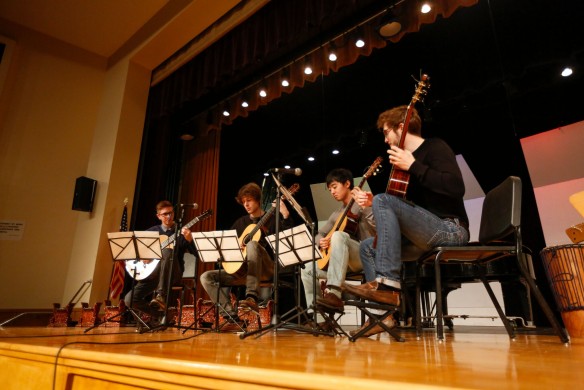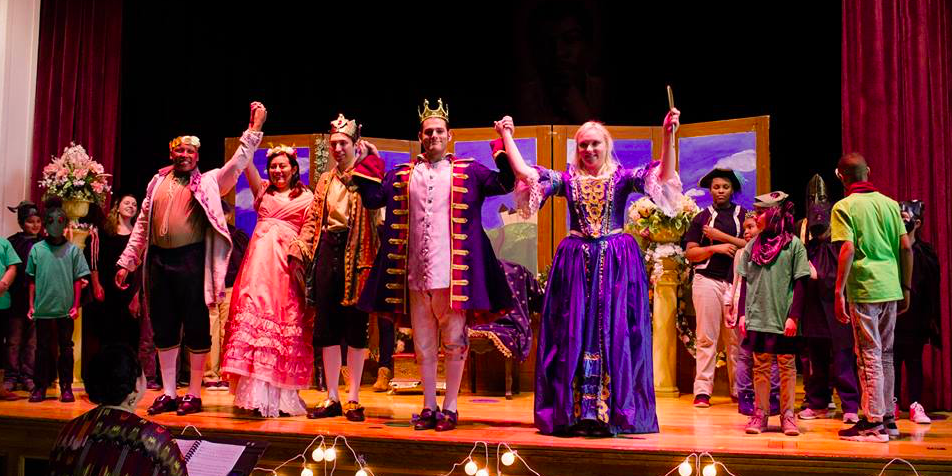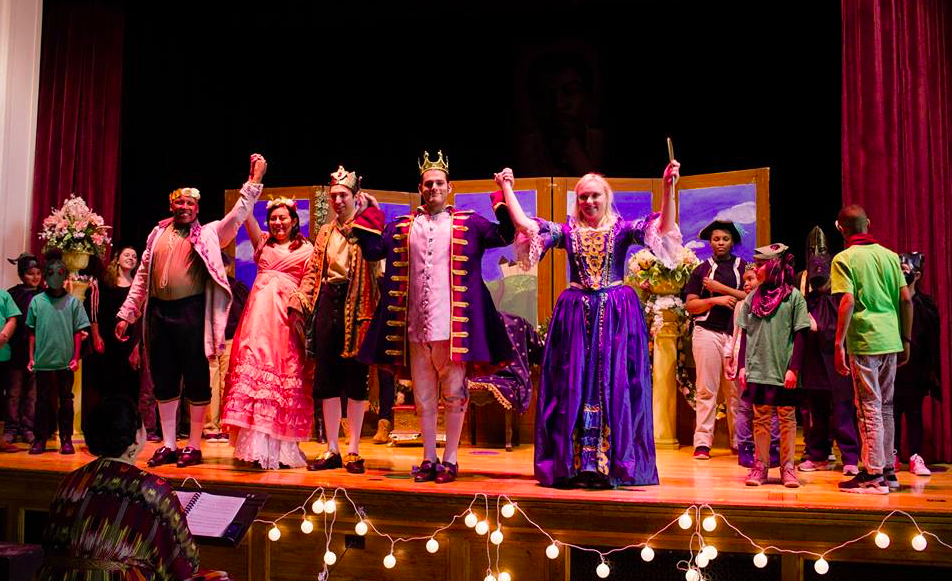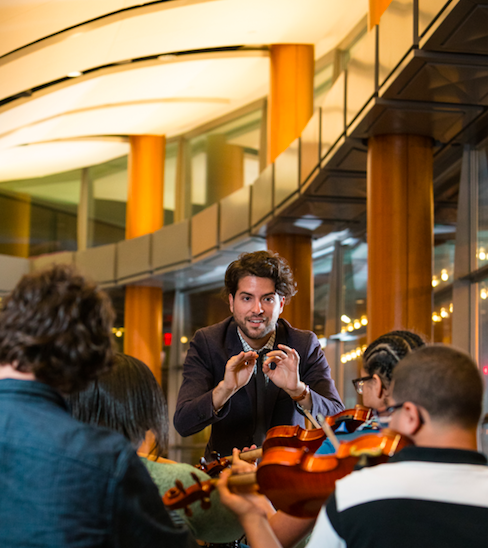EASTMAN GIVES BACK TO ROCHESTER
By Dan Gross
Recent graduates are using their talents and their entrepreneurial skills to enrich the Rochester community with music
More and more Eastman students recognize that to ensure the future of music, they must bring their music to the wide public – especially in communities that are underserved or lacking resources. For them, “For the enrichment of community life” is not just a slogan carved into the Eastman Theatre façade, it’s an essential key to the future of classical music. Three recent alumni are enriching life in Rochester.
ROCmusic Collaborative is a partnership of the Eastman School of Music, Eastman Community Music School, Hochstein School of Music & Dance, the City of Rochester, the Rochester Philharmonic Orchestra, and the Rochester City School District, that brings tuition-free, after-school classical music education to about 100 kids. Its current director, Alexander Peña ‘10E, ‘13E (MM), is bringing the non-profit outreach program to new heights.
Eastman Opera Collective (EOC) debuted just last April with the objective of “enriching and educating the Rochester community through the power of opera.” Led by Jennifer Lawrence ‘17E and Emily Cuk ‘17E (MM), Eastman voice students gave a month-long residency in a Rochester city school, preparing and performing a one-act opera with and for students.
EASTMAN OPERA COLLECTIVE
(Photos by Stephen Jones)
Jennifer Lawrence began singing opera in her freshman year of high school. Although she originally came to Eastman to study voice, another bug bit her. “For me, I would say it started when I became more interested in arts administration.”
Lawrence eventually became a University of Rochester KEY (Kauffman Entrepreneurial Year) Scholar. The program is a tuition-free, grant-based year awarded to scholars who present an entrepreneurial idea, along with classes and faculty mentoring that guides them through the steps of creating their own business organizations.
Jennifer’s lifelong interests in cognitive science, marketing (including a marketing internship with the Philadelphia Orchestra), and consumer psychology also played roles in creating EOC. She wanted to “turn people on to opera,” and to deduce why it’s unpopular. “My advisor – Professor of Theory Betsy Marvin – with whom I did an independent study on music cognition, helped me formulate this idea of the Eastman Opera Collective.”
Both of Emily’s Cuk’s parents are music teachers, and she fondly recalls family time spent watching opera for fun, or her mother programming her own elementary school operas. She eventually went to Bard College for her undergraduate degree in opera performance. But “I had an experience on the other side (of opera production), that I loved a lot more. I had that epiphany moment that’s supposed to exist in real life.” Emily joined the one-person opera direction program at Eastman.
Jennifer and Emily met while working together in Eastman’s fall 2015 production of Philip Glass’s Hydrogen Jukebox: Lawrence as a cast member, and Cuk working behind the scenes.
“I immediately thought she was brilliant,” Jennifer says. “I thought, ‘I need her.’” Emily agreed after being asked at the cast party. She muses that her agreement was driven by a similar sentiment:
“There’s this gray cloud that hangs over anybody who wants to have a career in opera,” Cuk said. “Which is, ‘How do you make it relevant, and how do you bring people into it?’”
Jennifer’s and Emily’s diverse backgrounds create a strong synergy. They often answer in unison, or finish each other’s sentences. “This is why we’re partners,” Jennifer says. “We complement each other very well, and so whatever I lack, she has, and whatever she lacks, I have.”
At first, they split the work evenly. Now, Jennifer’s job is more administrative, often acting as a liaison between EOC and its donors, and Emily handles the creative direction of the programs.
For their first major project, they took a program they dub “Opera In the Classroom” to the George Mather Forbes School No. 4 in Rochester. It was an instant fit: from the school’s administration to the skill and cooperation of its music teacher, Rachel Dobbs, and its art teacher, Kim Levitt. “Everyone who does this volunteers their time,” Emily says.
They helped the school put on a one-act children’s opera by Lori Laitman, The Three Feathers. It tells the story of Dora, one of three daughters of an old king who gives them magical feathers to find out who will inherit his kingdom. Dora meets the Frog King, the ruler of the Underworld, on her journey to the crown.
In advance of the performance on April 4, EOC spent the whole month of March giving clinics and lessons in conjunction with production of The Three Feathers. All of the kids were involved in painting the sets, making their own costumes, and rehearsing their own roles in the opera. Emily joked that they were their “stage moms.”
Three students from different grades served as the play’s narrators; a handful of others played small roles; and a huge group played bats and frogs: the Frog King’s minions. The kids had great involvement and ownership in the show; even though Eastman students filled the main roles – as well as acting as the accompanist and the conductor – the kids were the stars of The Three Feathers and enjoyed every moment. The School 4 gymnasium was stuffed with students for the performance; a lot of kids got an entertaining introduction to opera that day.
To put on The Three Feathers, EOC used small pockets of funding from their various sources. The opera department pitched in, providing the costumes for the Eastman student leads and a number of props. Between grant money from the KEY Scholar program, the Institute for Music Leadership, support from the Friends of Eastman Opera and Eileen Buholz, the benefit concert, and a crowdfunding campaign that exceeded its goal by 75%, The Three Feathers covered expenses and still left some money for the next project – a production for Rochester’s Fringe Festival in September of The Polite Abductress, an operetta with music and words by the late Eastman dean Douglas Lowry.
By combining yearly “Opera in the Classroom” initiatives with other community-centric projects for older demographics, like The Polite Abductress, Lawrence and Cuk want to create a systemic appreciation of opera in Rochester. If anyone can do it, it’s these two.
ROCMUSIC
Alex Peña is a first-generation American. Both of his parents were born and raised in Mexico, but immigrated to the United States; Alex and his brother were born in Texas. Although his family didn’t have a strong musical background, Alex was nurtured musically in Mission Viejo, California and in the San Antonio public school system, starting on the viola. His teacher, Allyson Dawkins ‘79E (MM), was married to the first violinist of the San Antonio Symphony. Access to music and the ability to go to concerts influenced him tremendously.
“I remember thinking musicians were magicians,” Alex says. “That they have focus, expression, and beauty. But their caring for art and humanity was captivating for me.”
His first experience working with a chamber group drove him to dig deeply into the scores, and immerse himself in interpreting music. His encouraging system of teachers, and glowing stories from his viola teacher, propelled him to Eastman.
“For me, playing and performing is the core of what I love to do… But there’s a part of me that feels like I wouldn’t have been introduced to classical music if I weren’t introduced to fine educators.”
He had an excellent experience at Eastman, the only school that allowed him to pursue music performance and music education. But what propelled him into the non-profit world, and the joys that come with it (such as grant writing), was the Arts Leadership certificate program. Alex would be able to flex his entrepreneurial muscles soon, despite his own admission that “he’s not a numbers guy.”
After many meetings between the partners that would come to create ROCmusic, the non-profit was officially founded in 2012, their solution to bringing access to classical music to the city of Rochester, not just its well-to-do suburbs.
Alex was finishing his master’s at the time, and he was fortunate to have a “comfortable job” at the Harley School as their strings teacher, in addition to teaching at the Eastman Community Music School (where he continues as director of ECMS’s Tutti Strings and Camarata Strings). He had admired El Sistema, a Venezuelan institution that brings classical music education to kids at a very young age, and connected with the message of why classical music is important to developing young people. This was the basic idea behind ROCMusic.
He took over ROCMusic in 2013, “terrified” about the exciting opportunity. Now in his sixth year of programming, Alex is bringing his “healthy addiction” to kids, in the same way that he was introduced to it. At ROCmusic, he works to not only develop young students into fine musicians, but to bring a love of classical music to Rochester, especially its urban community, with increased access and connections to art institutions that may have been lost over time. By combining all of his skills, Alex has overseen the growth of the program from about 30 students to 100, and the expansion to a second location.
None of the ROCmusic partners provide direct financial support; they provide scholarships, tickets to local classical concerts, and teachers and interns. An annual benefit concert at the Martin Luther King Jr. Park raises funds to provide free instruments, education in music and leadership development, transportation, and food for the kids.
Although Alex agrees that every day is filled with small and wonderful victories, he and ROCmusic are proud to report two especially successful high school students. Bassist Gustin Cook was accepted to the national “Take a Stand Festival’ in California (El Sistema USA’s summer festival) and the Rochester Philharmonic Youth Orchestra; violist Douglas Rodriguez (viola) was accepted to North Carolina’s Eastern Music Festival on a scholarship. (Alex notes that he attended the same festival when he was in high school.)
Both students began their instruction in the pilot year of ROCmusic; Cook started playing the bass with ROCmusic. Both “gentlemen,” as Alex refers to them, were once introverted, but now are already giving back: excelling at their instruments and becoming leaders in the ROCmusic classrooms and in their respective arts communities. They are also considering careers in music.
While ROCMusic continues the partnerships that have made the program flourish, they are also taking steps to provide classical music education to every kid in Rochester that wants it. ROCmusic plans to expand to its third and fourth sites, especially in the southern areas of the city. Alex and ROCmusic are using the momentum and positive energy of the past five years, as they close out the first chapter in their history.
Enriching Community life
Eastman has a long history of bringing music to the Rochester community. Here are several other recent projects which have had enthusiastic results:
Music for All (now called Eastman to Go) began in 1985 as a proposal for an audience-building project with a new and radical undergraduate requirement: that each student develop and be involved in a project “to initiate or foster an interest in music in an audience that does not normally attend concerts.” Music for All initially recruited eight student volunteer chamber music groups to perform locally at schools or at community sites such as senior centers and stores. Today, Music for All is integrated into Eastman’s chamber music curriculum:
“If Music Be the Food . . . “ was created in 2009 by Carol Rodland, former professor of viola, and is now coordinated by assistant professor of chamber music Mimi Hwang. Eastman faculty members and students, members of the Rochester Philharmonic Orchestra, other local professional musicians, and guests donate their time and talents so that all proceeds can go to the hungry via Foodlink. Audience members are asked to bring non-perishable food items or cash donations for Foodlink as the price of admission. Last season’s concerts raised more than $3,000 and collected nearly 1,000 pounds of food.
East High School Outreach was coordinated by doctoral guitar student Tom Torrisi in the spring of 2017, as a school-wide assembly that brought Eastman voice, jazz, and guitar students, as well as members of Gamelan Lila Muni to the East High School stage. The students gave brief performances and later held question-and-answer sessions with the students.
 (An Eastman student guitar ensemble joined jazz, opera, and gamelan musicians at a special assembly for East High School in spring 2017. Photograph by Michelle Martorell)
(An Eastman student guitar ensemble joined jazz, opera, and gamelan musicians at a special assembly for East High School in spring 2017. Photograph by Michelle Martorell)
The Gateways Music Festival, affiliated with Eastman since 1994, designed “to connect and support professional classical musicians of African descent”, is deeply committed to community engagement. During its six-day festival in Rochester, in addition to performances at Eastman, 125 Gateways musicians give more than 50 performances in houses of worship, libraries, civic and recreational center, retirement communities, private homes, and more. The Festival’s new Young Musicians Institute serves local community- and school-based music programs.
More information on Eastman’s community engagement initiatives can be found on the school’s website: esm.rochester.edu/engagement/



